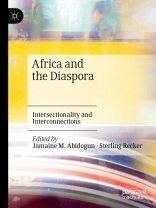This edited volume presents intersectionality in its various configurations and interconnections across the African continent and around the world as a concept. These chapters identify and discuss intersectionalities of identity and their interplay within precolonial, colonial, and neo-colonial constructs that develop unique and often conflicting interconnections. Scholars in this book address issues in cultural, feminist, Pan African, and postcolonial studies from interdisciplinary and traditional disciplines, including the Arts, Humanities, and Social Sciences. While Intersectionality as a framework for race, gender, and class is often applied in African-American studies, there is a dearth of work in its application to Africa and the Diaspora.
This book presents a diverse set of chapters that compare, contrast, and complicate identity constructions within Africa and the Diaspora utilizing the social sciences, the arts in film and fashion, and political economies to analyze and highlight often invisible distinctions of African identity and the resulting lived experiences. These chapters provide a discussion of intersectionality’s role in understanding Africa and the Diaspora and the intricate interconnections across its people, places, history, present, and future.
Inhoudsopgave
1. Introduction: Framing Africa and the Diaspora Intersectionalities and Interconnections.- 2. Revisiting the “Africa Is Sine Qua Non” Controversy: Stokely Carmichael and Walter Rodney.- 3. From African Natives to Native Americans: Charles Templeman Loram in North America.- 4. Performing Mariage Mondial Through Social Media.- 5. The Black Panther, Bridging the Gaps That Separate Us?.- 6. Obligation of Eldercare in the Context of Pentecostal Charismatic Churches.- 7. Behavioral Economics in North Kivu: Understanding the Complexity of Economic Rationality in Eastern Congo.- 8. One Nation Under Development? Comparing the Political Economy of Oil and Gas in Ghana and Nigeria.- 9. To Be an African City Under an Oil Dictatorship: Conflictual Intersections Seen from Ethnicity and Race in Malabo and Bioko Island (Equatorial Guinea).- 10. Conclusion: Africa and the Diaspora: Findings in Intersectionalities and Interconnections.
Over de auteur
Jamaine M. Abidogun is Professor Emeritus at Missouri State University, USA. Her areas of specialization include interdisciplinary African and African American Studies and Curriculum and Instruction in Secondary Education Social Sciences. She is the co-editor of The Palgrave Handbook of African Education and Indigenous Knowledge (2020).
Sterling Recker is Assistant Professor in the Department of Political and Social Sciences at North Central Missouri College, USA. Dr. Recker’s research focuses on rural political economy in Africa’s Great Lakes Region and the impact that conflict has on rural development strategies. He served on the St. Louis based Microfinancing Partners in Africa Board (2011–2016) where he assisted in the development of projects in Uganda, Tanzania, and Kenya and serves on Mid-America Alliance for African Studies Executive Board. He is a past-president and current secretary-treasurer and webmaster ofthe Mid-America Alliance of African Studies (MAAAS).











